15 jan 2016
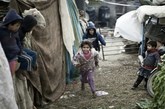
The European Union announced Friday that it would be sending €12.3 million ($13.4 million) to the Palestinian Authority’s social allowances program to benefit poor Palestinian families living in the West Bank and Gaza.
The contribution is the final portion of a €50 million ($54.5 million) pledge made by the EU in 2015 for the cash transfer program of the Palestinian Ministry of Social Affairs.
The EU said in a statement that it and its member states had contributed 40 percent of the program’s funding.
"The steady deterioration of the socio-economic conditions in Palestine is a matter of concern," EU representative Ralph Tarraf said. "One out of four Palestinians live in poverty. The situation is worse in Gaza, with an estimated poverty rate of almost 40 percent."
"The national cash transfer program plays an essential role in helping households in need to attain a minimally acceptable standard of living," he added. "We are committed to continue our support to social protection."
An estimated 121,000 Palestinian households, two thirds of them in the besieged Gaza Strip, are reportedly enrolled in the program.
The contribution is the final portion of a €50 million ($54.5 million) pledge made by the EU in 2015 for the cash transfer program of the Palestinian Ministry of Social Affairs.
The EU said in a statement that it and its member states had contributed 40 percent of the program’s funding.
"The steady deterioration of the socio-economic conditions in Palestine is a matter of concern," EU representative Ralph Tarraf said. "One out of four Palestinians live in poverty. The situation is worse in Gaza, with an estimated poverty rate of almost 40 percent."
"The national cash transfer program plays an essential role in helping households in need to attain a minimally acceptable standard of living," he added. "We are committed to continue our support to social protection."
An estimated 121,000 Palestinian households, two thirds of them in the besieged Gaza Strip, are reportedly enrolled in the program.

Another Palestinian refugee woman was proclaimed dead on Thursday after Lebanese hospitals refused to provide her with medical care at the pretext that the UNRWA stopped to pay for the health services offered to Palestinian refugees.
The Lebanese news website al-Nashra said that Saada Rumeid, from Burj el-Shemali refugee camp in southern Lebanon, died in Balsam hospital after several specialized hospitals refused to have her at the pretext they did not receive certain papers from the UNRWA, which recently decided to shrink the services it provided for the Palestinian refugees.
A few days ago, another Palestinian refugee also died after the UNRWA refused to pay for her medical treatment in a hospital.
A Palestinian young man, a resident of Burj el-Shemali camp who suffers from Thalassemia, torched himself recently after he failed to cover his medical expenses due to UNRWA cuts.
The Lebanese news website al-Nashra said that Saada Rumeid, from Burj el-Shemali refugee camp in southern Lebanon, died in Balsam hospital after several specialized hospitals refused to have her at the pretext they did not receive certain papers from the UNRWA, which recently decided to shrink the services it provided for the Palestinian refugees.
A few days ago, another Palestinian refugee also died after the UNRWA refused to pay for her medical treatment in a hospital.
A Palestinian young man, a resident of Burj el-Shemali camp who suffers from Thalassemia, torched himself recently after he failed to cover his medical expenses due to UNRWA cuts.
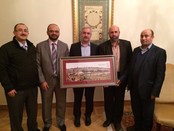
A delegation of the committee of Palestine’s scholars abroad, the Turkish assembly in solidarity with Palestine (Vidar) and Palestine charity committee, met with the adviser of the Turkish minister for refugee affairs, Mustafa Yatash, to address the conditions of Palestinian refugees in Turkey.
In the meeting that was held in Istanbul on Wednesday, the Turkish adviser underlined that Turkey has decided to treat Palestinian refugees as equal to Syrian refugees in all privileges with no exceptions.
It has been agreed to complete the procedures for granting residence permits to Palestinian refugees who reside in Turkey after collecting data from the Palestinian institutions in the country. The delegation presented a summary on the numbers and conditions of Palestinian refugees in Turkey.
In the meeting that was held in Istanbul on Wednesday, the Turkish adviser underlined that Turkey has decided to treat Palestinian refugees as equal to Syrian refugees in all privileges with no exceptions.
It has been agreed to complete the procedures for granting residence permits to Palestinian refugees who reside in Turkey after collecting data from the Palestinian institutions in the country. The delegation presented a summary on the numbers and conditions of Palestinian refugees in Turkey.
14 jan 2016
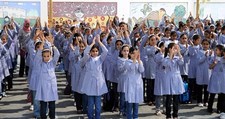
The United Nations Relief and Works Agency (UNRWA) launched on Thursday its US$ 817 million emergency appeals for Syria and the occupied Palestinian territory where hundreds of refugees continue to experience the relentless effects of conflict, occupation and blockade.
The majority of the estimated 450,000 Palestinian refugees in Syria are displaced and 95 percent of them rely on UNRWA for assistance.
Thousands remain trapped in areas of active conflict, where they face appalling suffering. Tens of thousands have fled to Lebanon and Jordan where they face increasing marginalization and despair.
According to the UNRWA statement, Palestinian refugees in the occupied territories are exposed to the lasting consequences of an occupation now approaching 50 years and a decade-long blockade, which define every aspect of their lives.
While in the year 2000, roughly 80,000 people in Gaza were reliant on humanitarian assistance, the figure has risen to over 830,000 today. In the West Bank, settlement building activity has left many thousands at risk of forced displacement and dispossession, UNRWA added.
UNRWA is a United Nations agency established by the General Assembly in 1949 and mandated to provide assistance and protection to some five million registered Palestinian refugees. Its mission is to help Palestine refugees in Jordan, Lebanon, Syria, West Bank and the Gaza Strip achieve their full human development potential, pending a just and lasting solution to their plight.
Murra: The reduction of UNRWA’s services threatens RoR
The media official of Hamas Movement in Lebanon, Ra'fat Murrah, said that the reduction of UNRWA’s services has negative political implications. It ends the issue of refugees and opens the door for resettlement which in turn would abolish the right of return, he said.
In a statement on Thursday, Murra stressed the need to cancel all of the reduction decisions and to improve levels of education, health and social work services.
The reduction of UNRWA’s services means transferring the file of refugees to the host state which means that the Lebanese government will have no choice but to bear the burden of health, education, and social services' costs or to abandon caring and relieving the Palestinian refugees, Murra said.
He underlined that halting the UNRWA’s services will lead to social and humanitarian crises that threaten the political, social, and security stability in refugee camps as well as Palestinian communities in Lebanon.
The majority of the estimated 450,000 Palestinian refugees in Syria are displaced and 95 percent of them rely on UNRWA for assistance.
Thousands remain trapped in areas of active conflict, where they face appalling suffering. Tens of thousands have fled to Lebanon and Jordan where they face increasing marginalization and despair.
According to the UNRWA statement, Palestinian refugees in the occupied territories are exposed to the lasting consequences of an occupation now approaching 50 years and a decade-long blockade, which define every aspect of their lives.
While in the year 2000, roughly 80,000 people in Gaza were reliant on humanitarian assistance, the figure has risen to over 830,000 today. In the West Bank, settlement building activity has left many thousands at risk of forced displacement and dispossession, UNRWA added.
UNRWA is a United Nations agency established by the General Assembly in 1949 and mandated to provide assistance and protection to some five million registered Palestinian refugees. Its mission is to help Palestine refugees in Jordan, Lebanon, Syria, West Bank and the Gaza Strip achieve their full human development potential, pending a just and lasting solution to their plight.
Murra: The reduction of UNRWA’s services threatens RoR
The media official of Hamas Movement in Lebanon, Ra'fat Murrah, said that the reduction of UNRWA’s services has negative political implications. It ends the issue of refugees and opens the door for resettlement which in turn would abolish the right of return, he said.
In a statement on Thursday, Murra stressed the need to cancel all of the reduction decisions and to improve levels of education, health and social work services.
The reduction of UNRWA’s services means transferring the file of refugees to the host state which means that the Lebanese government will have no choice but to bear the burden of health, education, and social services' costs or to abandon caring and relieving the Palestinian refugees, Murra said.
He underlined that halting the UNRWA’s services will lead to social and humanitarian crises that threaten the political, social, and security stability in refugee camps as well as Palestinian communities in Lebanon.
13 jan 2016
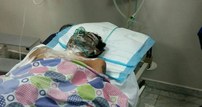
Member of Hamas Movement’s political bureau Ezzat al-Resheq called Tuesday evening on UNRWA to reconsider its decision to reduce its health and relief services to Palestinian refugees in Lebanon.
Resheq’s statement came shortly after a Palestinian refugee burned himself in protest against UNRWA aid reduction and after a Palestinian sick woman died without receiving any medical treatment.
UNRWA’s "immoral and inhuman" decision to reduce its relief aid will only deepen the Palestinian refugees’ suffering in Lebanon, he said.
A state of anger prevailed on Monday and Tuesday throughout the Palestinian refugee camps in Lebanon after UNRWA refused to pay the hospital treatment charges for a Palestinian sick woman who died without receiving any medical treatment.
Hundreds of angry protesters closed UNRWA offices in a number of refugee camps, Palestinian sources said.
Hamas office in Lebanon earlier warned in this regard of the escalating tensions and the continued popular protests in the refugee camps, warning of the serious social and humanitarian consequences of UNRWA’s decision.
UNRWA had earlier decided to reduce its aid allocated for Palestinian refugees in Lebanon. The Palestinian refugee in Lebanon has now to pay 20 percent of hospitalization costs in government, NGO, and private hospitals.
Resheq’s statement came shortly after a Palestinian refugee burned himself in protest against UNRWA aid reduction and after a Palestinian sick woman died without receiving any medical treatment.
UNRWA’s "immoral and inhuman" decision to reduce its relief aid will only deepen the Palestinian refugees’ suffering in Lebanon, he said.
A state of anger prevailed on Monday and Tuesday throughout the Palestinian refugee camps in Lebanon after UNRWA refused to pay the hospital treatment charges for a Palestinian sick woman who died without receiving any medical treatment.
Hundreds of angry protesters closed UNRWA offices in a number of refugee camps, Palestinian sources said.
Hamas office in Lebanon earlier warned in this regard of the escalating tensions and the continued popular protests in the refugee camps, warning of the serious social and humanitarian consequences of UNRWA’s decision.
UNRWA had earlier decided to reduce its aid allocated for Palestinian refugees in Lebanon. The Palestinian refugee in Lebanon has now to pay 20 percent of hospitalization costs in government, NGO, and private hospitals.
11 jan 2016
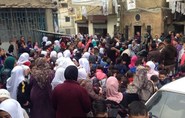
Palestinian refugees Monday morning closed down the UNRWA’s centers in some of the refugee camps based in Lebanon.
Hundreds of refugees in both camps, of Burj al-Shamali in southern Lebanon and al-Badawi in the north, forced the closure of UNRWA’s health and management centers in protest against the reduction of their health services and financial aid to the sick refugees.
The Palestinian refugees also closed the entrances of the camps as an expression of their outrage over the reduction of UNRWA’s health services program in Lebanon as of the beginning of 2016.
Hundreds of refugees in both camps, of Burj al-Shamali in southern Lebanon and al-Badawi in the north, forced the closure of UNRWA’s health and management centers in protest against the reduction of their health services and financial aid to the sick refugees.
The Palestinian refugees also closed the entrances of the camps as an expression of their outrage over the reduction of UNRWA’s health services program in Lebanon as of the beginning of 2016.
9 jan 2016
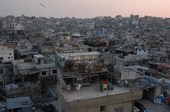
Palestinian refugees in Lebanon refused UNRWA’s decision to reduce its financial aid to the refugees based in Lebanon’s refugee camps starting from the beginning of 2016.
The Palestinian forces, for their part, declared their rejection of the step and declared their intention to tour Arab and western countries to convince them to reverse UNRWA’s decision of reducing its services gradually. The tour is also aimed at coming up with a permanent solution to UNRWA’s financial crisis. Meanwhile, Hamas Movement refused the decision and called for a large-scale action against it.
The UNRWA's decision enraged the Palestinians in Lebanon refugee camps. Massive demonstrations marched out on Friday in Ain al-Hilweh refugee camp and other camps in Sour’s area.
As for camps in north Lebanon, the popular movement in Nahr al-Bared camp organized two sit-ins against the decision; one in front of UNRWA’s clinic in Nahr al-Bared camp and the other before UNRWA’s headquarters in Beirut. The people of the camp allowed the medical staff to enter the clinic after being closed for a few days in protest against stopping the emergency program.
The Palestinian forces, for their part, declared their rejection of the step and declared their intention to tour Arab and western countries to convince them to reverse UNRWA’s decision of reducing its services gradually. The tour is also aimed at coming up with a permanent solution to UNRWA’s financial crisis. Meanwhile, Hamas Movement refused the decision and called for a large-scale action against it.
The UNRWA's decision enraged the Palestinians in Lebanon refugee camps. Massive demonstrations marched out on Friday in Ain al-Hilweh refugee camp and other camps in Sour’s area.
As for camps in north Lebanon, the popular movement in Nahr al-Bared camp organized two sit-ins against the decision; one in front of UNRWA’s clinic in Nahr al-Bared camp and the other before UNRWA’s headquarters in Beirut. The people of the camp allowed the medical staff to enter the clinic after being closed for a few days in protest against stopping the emergency program.
8 jan 2016
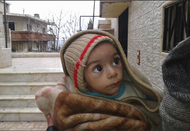
By Azzam Tamimi
Lebanon's Hezbollah was, until a few years ago, an inspiration to millions of people in the Middle East and around the world. It was a symbol of heroic resistance putting up a long fight to liberate the occupied territories of south Lebanon and continuing to stand up to Israeli aggression post-liberation.
There was a time when Hassan Nasrallah, Hezbollah's leader, was hailed as “master of the resistance”. His pictures were posted all over Palestinian refugee camps in Lebanon and were treasured by households across the Arab world. When he gave one of his usually long speeches, people were glued to TV sets and his Almanar satellite TV channel was no less popular than Al Jazeera itself. Many Palestinians truly believed Nasrallah was such a great resistance leader and they wished they had someone like him to lead their own resistance.
Yet today Hezbollah has lost much of the popular support and sympathy it once enjoyed and its leader Nasrallah is ridiculed and condemned by many of those who previously adored him. It is fighting a completely different type of war. Acting upon instructions from its sponsors in Tehran, where a reactionary clerical regime reigns, it is fighting a war in defence of a corrupt despotic regime that reigns in Damascus.
Unlike Hezbollah, Hamas, the Palestinian Islamic Resistance Movement – which saw itself as a partner of Hezbollah in the struggle against Zionism, refused to bow to pressure from the Iranians. Although Syria was, according to Hamas leader Khaled Meshaal, the best haven Hamas ever had outside Palestine, the movement opted to sacrifice all the privileges it had there so as to avoid taking any part in oppressing the Syrian people.
Since leaving Damascus four years ago, Meshaal turned down several invitations from the Iranians to visit Tehran, whose rulers made his visit a precondition for the resumption of any financial aid. Undoubtedly, the Syrian crisis drove deep a wedge between Hamas on the one hand and Hezbollah and Iran on the other.
Since the war started more than four years ago, there have been numerous reports of war crimes perpetrated by Hezbollah troops and other Iranian-sponsored Shia militias in various parts of Syria. Yet nothing has been as shocking as what Hezbollah is accused of perpetrating these days.
Videos and images coming out of the district of Madaya on the outskirts of Damascus are reminiscent of World War II images of concentration camp victims of Nazism. Men, women and children have been dying daily due to starvation and harsh winter weather. The victims and activists seeking to bring their plight to world attention have accused Hezbollah forces of laying siege to the district preventing any passage of aid to its several thousand inhabitants. The tragedy is that this was one of the Syrian districts that provided shelter to Lebanese pro-Hezbollah communities when they were forced to flee their towns and villages in the south of Lebanon when Israel waged its devastating July 2006 war against them.
Iran and Hezbollah, who both once claimed to stand in support of the oppressed in this world, are today tools of oppression, tormenting and persecuting the Syrian people. Both Hezbollah and its Iranian sponsor are equal partners with the Assad regime and bear responsibility for the millions who have fled their homes, the hundreds of thousands who have been killed and the many thousands who are today being starved to death.
Yet, Iran and Hezbollah would not have had a free hand to kill, maim and torture the Syrian population had it not been for an international community that seemed unbothered with what was going on. Regional and international players have had their own reckoning and their own priorities. Throughout the past four years, the United States and its Western allies had their eyes set on the goal of concluding a deal with Iran over its nuclear programme.
In order to guarantee themselves success they were keen not to provoke the Iranians or alienate them. At the same time, these Western powers, together with many regional ones, deemed it unhelpful to them for democratic transition to succeed anywhere in the Arab world lest it might deliver to power groups with which they shared little vision if any at all.
The only thing that seems to be worth the attention of the international community has been the war on terrorism, which means specifically the campaign targeting Sunni Islamic groups from the most extreme, such as the Islamic State (IS) group, to the most moderate such as the Muslim Brotherhood. The irony is that IS emerged and rose to prominence only after the Muslim Brotherhood's peaceful quest for democratisation was frustrated, particularly following the military coup in Egypt and the tragedy of Rabaa. We are yet to see what the tragedy of Syria's Madaya will unleash.
- Azzam Tamimi is a Palestinian British academic and chairman of Alhiwar TV Channel.
The article was published in the Middle East Eye website.
Lebanon's Hezbollah was, until a few years ago, an inspiration to millions of people in the Middle East and around the world. It was a symbol of heroic resistance putting up a long fight to liberate the occupied territories of south Lebanon and continuing to stand up to Israeli aggression post-liberation.
There was a time when Hassan Nasrallah, Hezbollah's leader, was hailed as “master of the resistance”. His pictures were posted all over Palestinian refugee camps in Lebanon and were treasured by households across the Arab world. When he gave one of his usually long speeches, people were glued to TV sets and his Almanar satellite TV channel was no less popular than Al Jazeera itself. Many Palestinians truly believed Nasrallah was such a great resistance leader and they wished they had someone like him to lead their own resistance.
Yet today Hezbollah has lost much of the popular support and sympathy it once enjoyed and its leader Nasrallah is ridiculed and condemned by many of those who previously adored him. It is fighting a completely different type of war. Acting upon instructions from its sponsors in Tehran, where a reactionary clerical regime reigns, it is fighting a war in defence of a corrupt despotic regime that reigns in Damascus.
Unlike Hezbollah, Hamas, the Palestinian Islamic Resistance Movement – which saw itself as a partner of Hezbollah in the struggle against Zionism, refused to bow to pressure from the Iranians. Although Syria was, according to Hamas leader Khaled Meshaal, the best haven Hamas ever had outside Palestine, the movement opted to sacrifice all the privileges it had there so as to avoid taking any part in oppressing the Syrian people.
Since leaving Damascus four years ago, Meshaal turned down several invitations from the Iranians to visit Tehran, whose rulers made his visit a precondition for the resumption of any financial aid. Undoubtedly, the Syrian crisis drove deep a wedge between Hamas on the one hand and Hezbollah and Iran on the other.
Since the war started more than four years ago, there have been numerous reports of war crimes perpetrated by Hezbollah troops and other Iranian-sponsored Shia militias in various parts of Syria. Yet nothing has been as shocking as what Hezbollah is accused of perpetrating these days.
Videos and images coming out of the district of Madaya on the outskirts of Damascus are reminiscent of World War II images of concentration camp victims of Nazism. Men, women and children have been dying daily due to starvation and harsh winter weather. The victims and activists seeking to bring their plight to world attention have accused Hezbollah forces of laying siege to the district preventing any passage of aid to its several thousand inhabitants. The tragedy is that this was one of the Syrian districts that provided shelter to Lebanese pro-Hezbollah communities when they were forced to flee their towns and villages in the south of Lebanon when Israel waged its devastating July 2006 war against them.
Iran and Hezbollah, who both once claimed to stand in support of the oppressed in this world, are today tools of oppression, tormenting and persecuting the Syrian people. Both Hezbollah and its Iranian sponsor are equal partners with the Assad regime and bear responsibility for the millions who have fled their homes, the hundreds of thousands who have been killed and the many thousands who are today being starved to death.
Yet, Iran and Hezbollah would not have had a free hand to kill, maim and torture the Syrian population had it not been for an international community that seemed unbothered with what was going on. Regional and international players have had their own reckoning and their own priorities. Throughout the past four years, the United States and its Western allies had their eyes set on the goal of concluding a deal with Iran over its nuclear programme.
In order to guarantee themselves success they were keen not to provoke the Iranians or alienate them. At the same time, these Western powers, together with many regional ones, deemed it unhelpful to them for democratic transition to succeed anywhere in the Arab world lest it might deliver to power groups with which they shared little vision if any at all.
The only thing that seems to be worth the attention of the international community has been the war on terrorism, which means specifically the campaign targeting Sunni Islamic groups from the most extreme, such as the Islamic State (IS) group, to the most moderate such as the Muslim Brotherhood. The irony is that IS emerged and rose to prominence only after the Muslim Brotherhood's peaceful quest for democratisation was frustrated, particularly following the military coup in Egypt and the tragedy of Rabaa. We are yet to see what the tragedy of Syria's Madaya will unleash.
- Azzam Tamimi is a Palestinian British academic and chairman of Alhiwar TV Channel.
The article was published in the Middle East Eye website.

Hamas Movement’s representative in Lebanon Ali Baraka renewed his group’s total rejection of UNRWA’s decision to reduce its financial aid to Palestinian refugees based in Lebanon refugee camps.
Baraka also called on UNRWA to reverse its decision.
Baraka’s remarks came during a meeting with UNRWA General Director in Lebanon Matthias Schmale on Friday.
They discussed UNRWA’s recent decisions to reduce its health services to Palestinian refugees in Lebanon.
Baraka called during the meeting for urgent solutions to increase financial support for UNRWA in order to safeguard and advance the rights of Palestine refugees in Lebanon.
UNRWA had earlier decided to reduce its aid allocated for Palestinian refugees in Lebanon. The Palestinian refugee in Lebanon has now to pay 20 percent of hospitalization costs in government, NGO, and private hospitals.
Baraka also called on UNRWA to reverse its decision.
Baraka’s remarks came during a meeting with UNRWA General Director in Lebanon Matthias Schmale on Friday.
They discussed UNRWA’s recent decisions to reduce its health services to Palestinian refugees in Lebanon.
Baraka called during the meeting for urgent solutions to increase financial support for UNRWA in order to safeguard and advance the rights of Palestine refugees in Lebanon.
UNRWA had earlier decided to reduce its aid allocated for Palestinian refugees in Lebanon. The Palestinian refugee in Lebanon has now to pay 20 percent of hospitalization costs in government, NGO, and private hospitals.
6 jan 2016
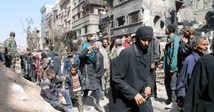
Palestinian refugee families living in shelter centers in Qudsayya area in Reef Dimashq (Damascus), appealed to humanitarian organizations, relief institutions, and philanthropists, to extend a helping hand to them and help them to ward off the hazards of the freezing winter weather.
An activist working in one of the shelter centers was quoted in a report prepared by the National Working Group for Palestinians in Syria as saying that "the families are in dire need of heating means, even wood, and the children are in need of winter clothing".
He pointed out that in 2015, five children died because of the cold. He held all concerned parties the responsibility of the death of any of the refugees because of the cold and hunger.
The report added, "About 6000 families of Palestinian refugees displaced from the Yarmouk refugee camp and other camps and relocated in Qudsayya district in Reef Dimashq governorate, experience a real tragedy as a result of the blockade imposed by the Syrian regime forces on the area since last July, which reflected negatively on these families. The Palestinian refugees were prevented to enter into and exit from those camps due to the blockade except for the employees; furthermore, the entry of any kind of goods into the camps was blocked unless a bribe is paid to the soldiers at the security barriers”.
The report pointed out that the UN Relief and Works Agency for Palestine Refugees, UNRWA, stopped its aid to Palestinian refugees who were displaced from their camps and resided in a school in Adra in Reef Dimashq governorate, under the pretext that the support provided for the Agency had been reduced.
A number of the displaced people from Yarmouk refugee camp living in the school, affirmed that UNRWA stopped providing its monthly aid consisting of a food package and a medical package, in addition to some supplies for children, while those in charge of UNRWA are fully aware that the families taking refuge in the Adra school depend almost completely on the aid provided by the Agency.
Hundreds of Palestinian refugees, who fled the Yarmouk refugee camp because it was targeted, resorted to Alliance Institute in Damascus, but the Syrian security forces forced them out of the institute under threat of arrest, and told them to go to the school in the city of Adra in Reef Dimashq governorate.
The school was initially inhabited by about 800 people displaced from the Yarmouk refugee camp, but as a result of the casualties among them due to the clashes between regime and opposition forces in Syria their number decreased to about 400 refugees.
An activist working in one of the shelter centers was quoted in a report prepared by the National Working Group for Palestinians in Syria as saying that "the families are in dire need of heating means, even wood, and the children are in need of winter clothing".
He pointed out that in 2015, five children died because of the cold. He held all concerned parties the responsibility of the death of any of the refugees because of the cold and hunger.
The report added, "About 6000 families of Palestinian refugees displaced from the Yarmouk refugee camp and other camps and relocated in Qudsayya district in Reef Dimashq governorate, experience a real tragedy as a result of the blockade imposed by the Syrian regime forces on the area since last July, which reflected negatively on these families. The Palestinian refugees were prevented to enter into and exit from those camps due to the blockade except for the employees; furthermore, the entry of any kind of goods into the camps was blocked unless a bribe is paid to the soldiers at the security barriers”.
The report pointed out that the UN Relief and Works Agency for Palestine Refugees, UNRWA, stopped its aid to Palestinian refugees who were displaced from their camps and resided in a school in Adra in Reef Dimashq governorate, under the pretext that the support provided for the Agency had been reduced.
A number of the displaced people from Yarmouk refugee camp living in the school, affirmed that UNRWA stopped providing its monthly aid consisting of a food package and a medical package, in addition to some supplies for children, while those in charge of UNRWA are fully aware that the families taking refuge in the Adra school depend almost completely on the aid provided by the Agency.
Hundreds of Palestinian refugees, who fled the Yarmouk refugee camp because it was targeted, resorted to Alliance Institute in Damascus, but the Syrian security forces forced them out of the institute under threat of arrest, and told them to go to the school in the city of Adra in Reef Dimashq governorate.
The school was initially inhabited by about 800 people displaced from the Yarmouk refugee camp, but as a result of the casualties among them due to the clashes between regime and opposition forces in Syria their number decreased to about 400 refugees.
5 jan 2016
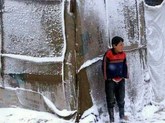
8,000 Palestinian refugees, who migrated from Syria to Turkey, have been suffering harsh living conditions especially in southern Turkish cities of Kielce, Urfa, Mersin, Antioch and others.
The Palestinian migrants complain of the lack of job opportunities, poverty, too expensive rentals and harsh living conditions because of the extreme cold weather and the lack of heating means. Besides, many of students refrain from joining Syrian schools.
The Turkish regulations do not allow the entry of Palestinians into Turkey without visa, which force them to enter the country illegally and thus put themselves in danger.
The Palestinian refugees in Turkey appealed to the President of Turkey Recep Tayyip Erdogan and the Turkish government to help them and improve their humanitarian and legal conditions as well as allowing Palestinians to enter Turkey without visa.
The Palestinian migrants complain of the lack of job opportunities, poverty, too expensive rentals and harsh living conditions because of the extreme cold weather and the lack of heating means. Besides, many of students refrain from joining Syrian schools.
The Turkish regulations do not allow the entry of Palestinians into Turkey without visa, which force them to enter the country illegally and thus put themselves in danger.
The Palestinian refugees in Turkey appealed to the President of Turkey Recep Tayyip Erdogan and the Turkish government to help them and improve their humanitarian and legal conditions as well as allowing Palestinians to enter Turkey without visa.
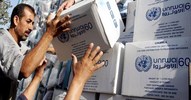
Hamas Movement has considered UNRWA’s decision to reduce its financial aid to Palestinian refugees based in Lebanon refugee camps as a crime against the Palestinian people.
Hamas Office of Refugees Affairs in Lebanon declared in a statement on Monday evening its total rejection of the decision, calling for aborting it by all possible peaceful means.
UNRWA had earlier decided to reduce its aid allocated for Palestinian refugees in Lebanon. The Palestinian refugee in Lebanon has to pay 20 percent of hospitalization costs in government, NGO, and private hospitals.
Hamas called for an urgent action to stop implementing such a decision, stressing the need for holding a meeting between Palestinian factions and the Palestinian embassy in Lebanon to discuss the current challenges.
The Movement also urged the UN, the donor countries, and the Lebanese government to exert pressure on UNRWA to reverse the decision.
Hamas Office of Refugees Affairs in Lebanon declared in a statement on Monday evening its total rejection of the decision, calling for aborting it by all possible peaceful means.
UNRWA had earlier decided to reduce its aid allocated for Palestinian refugees in Lebanon. The Palestinian refugee in Lebanon has to pay 20 percent of hospitalization costs in government, NGO, and private hospitals.
Hamas called for an urgent action to stop implementing such a decision, stressing the need for holding a meeting between Palestinian factions and the Palestinian embassy in Lebanon to discuss the current challenges.
The Movement also urged the UN, the donor countries, and the Lebanese government to exert pressure on UNRWA to reverse the decision.
1 jan 2016
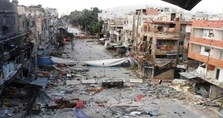
3089 Palestinian refugees have been killed since the Syrian crisis began in 2011, while 1028 others have been imprisoned, a rights group revealed.
The Action Group for Palestinian Refugees in Syria underlined that 427 of the reported victims were tortured to death whereas 184 others were starved to death due to the tight siege imposed on the Yarmouk refugee camp by the Syrian regime forces.
The Action Group also pointed out that 1028 Palestinians have been imprisoned in the Syrian regime prisons and detention centers.
A detailed report about the victims and detainees’ names and death causes will be soon issued, the group said.
The Action Group for Palestinian Refugees in Syria underlined that 427 of the reported victims were tortured to death whereas 184 others were starved to death due to the tight siege imposed on the Yarmouk refugee camp by the Syrian regime forces.
The Action Group also pointed out that 1028 Palestinians have been imprisoned in the Syrian regime prisons and detention centers.
A detailed report about the victims and detainees’ names and death causes will be soon issued, the group said.
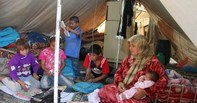
The UNRWA has said it will provide financial support of 1.77 million dollars for the owners of destroyed houses in the Gaza Strip.
The UNRWA stated on Thursday that these funds would be given to 7,443 Palestinian families in different areas of Gaza.
The agency asserted that the aid would be earmarked for emergency housing purposes, which includes home repairs and reconstruction as well as temporary accommodation solutions.
The UNRWA stated on Thursday that these funds would be given to 7,443 Palestinian families in different areas of Gaza.
The agency asserted that the aid would be earmarked for emergency housing purposes, which includes home repairs and reconstruction as well as temporary accommodation solutions.
Page: 2 - 1
